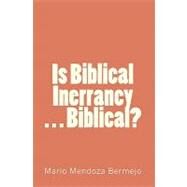Is Biblical Inerrancy. . . Biblical?
, by Bermejo, Mario Mendoza- ISBN: 9781453775592 | 1453775595
- Cover: Paperback
- Copyright: 8/28/2010
The debate on Biblical inerrancy has been raging among Evangelicals for decades now. Advocates of Biblical inerrancy use axioms and corollaries to support their claim and resort extensively to deductive reasoning to build up their case. The main axioms are: 1) the Bible is the word of God, and 2) full inspiration necessarily means all the books of the Bible are inerrant. This book shows clearly these axioms are unbiblical. What the Bible calls "the word of God" is spoken and heard, not written and read. What is written and read, that is the Bible, is only a written record of how the word of God was proclaimed and received by the people in Biblical times. This book also shows that divine inspiration has more to do with speaking rather than with writing. The narrow view of inspiration being limited to or focused on writing, based on one verse alone (2 Tim. 3:16), neglects the way God has communicated His word in redemptive history primarily through speaking, not writing.The Biblical meaning of the terms "word of God" and "inspiration" is derived from the historical-redemptive (HR) approach in understanding the Bible. This approach takes into serious consideration the history of redemption as recorded in the Bible. A survey of God's mode of communication over successive periods in redemptive history reveals the true nature of what the Bible calls "the word of God" and "inspiration" - the Patriarchal age, the age of the prophets under the Old Covenant, the intervening period between the Old and New Testaments, Jesus' time on earth, and the apostolic era. Against the conclusions arrived at using the HR approach, the theory of Biblical inerrancy is reviewed and clearly shown as unbiblical. The theory of plenary verbal inspiration of the Bible is also proven to be inimical to the Bible being an objective witness to Jesus Christ.







